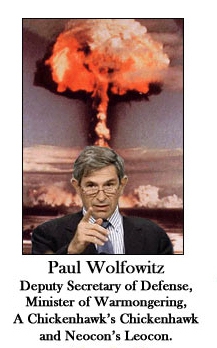Of the various possible explanations of U.S. foreign policy, the most powerful hypothesis is that the Wolfowitz Doctrine in its original undiluted form is the guiding light of U.S. policy. No other competing explanations can rationalize as well as it can the wide range and locations of U.S. government actions, their shifts, their indifference to human life, and their apparent contradictions.
The single most important feature of this doctrine is that it casts the U.S. in a worldwide activist role whose aim is “to deter or defeat attack from whatever source”. And it proposes to accomplish this by precluding “any hostile power from dominating a region critical to our interests…”
This doctrine is conditioned by two world wars and a cold war. It says “never again”. It looks for a worldwide peace and order made in Washington and backed up by American power. It says that no powerful aggressor or potential aggressor like Germany, Japan or the Soviet Union shall be allowed by the U.S. again to rise and threaten world war or even the world order.
It is one thing to propose utopian goals. It is quite another thing to devise a means for accomplishing them. Attempting a pax Americana in practice is turning into endless warfare without reducing threats. The U.S. government itself has become the largest threat to world peace and regional stability. The U.S. government is producing countervailing forces and weakening America. If no Germany or Japan has arisen again, at least yet, it is not because the U.S. government’s policies have prevented such an occurrence. It is simply because the world’s consciousness has moved on from the ashes of two world wars and the dark tensions of a cold war.
The Wolfowitz Doctrine is extreme. It assumes that the U.S. government has the will, the insight, the wisdom, the moral fiber and the capabilities of recognizing and dealing with threats. It assumes that those on the receiving end of American restrictions, bombs, sanctions, deals, payoffs, loans, wars, institutions and ideas will either accept them or be made to accept them. It assumes away the interests of other nations that diverge from those of the U.S. It assumes that the U.S. government is right for these tasks and can do them right, this despite the fact that the U.S. military has shown itself unable to deal with insurgencies, to mention just one irksome limitation of American power. It’s extreme in its worldwide scope. It turns out that there is no region that cannot be defined as critical to U.S. interests. It also turns out that there is no threat that is to small to be defined as a threat that could grow into a larger threat. Under the Wolfowitz Doctrine, the U.S. looks for enemies, even when they are not either visible or being gestated.
The Wolfowitz Doctrine is activist. It gives the foreign policy establishment in and out of government an open-ended assignment. State and Defense revel in it. It gives the think tanks, the defense establishment, the defense companies, the mercenaries and the intelligence bureaus open-ended possibilities for mischief.
The worst thing about the Wolfowitz Doctrine is that it sounds good. It sounds like a good thing. It sounds like a good thing to do. Presidents and cabinet officers can sign on to it and feel as if they are doing good and right things. How can it not be good to remove “bad guys” who are threats? How can it not be good to defend some foreign nation’s borders from rebels or insurgents? The Vietnam War shows that it can be very bad to attempt to hold a border. Iraq shows that it can be very bad to remove a bad guy and destroy a government. Many, many bad things can happen as a result of attempting to do what seem to be good things to those attempting to implement the Wolfowitz Doctrine.
 In practice, as operations in the Middle East show, nothing is as simple as the Wolfowitz Doctrine makes it sound. What’s on paper or in some dreamer’s or planner’s head is not what happens in reality.
In practice, as operations in the Middle East show, nothing is as simple as the Wolfowitz Doctrine makes it sound. What’s on paper or in some dreamer’s or planner’s head is not what happens in reality.
The Wolfowitz Doctrine is what has guided U.S. action everywhere, even in the War on Terror. All it took was for Washington to think of terrorism as a massive threat, and 9/11 saw to that. Then it became a simple if crude and unthinking application of the Doctrine to attack Afghanistan and then Iraq. Sanctions on Iran and undermining Iraq easily fell within its scope. So did Libya. Bombing Yugoslavia clearly could be rationalized by this Doctrine. Europe, in this thinking, must somehow be kept pure and free from battles and internal dissensions and struggles, even if it takes a war or two to stop such battles. On paper, there can be no struggles any longer because they are threats to “stability”. The planners become blind to the fact that attempts to enforce stability strictly produce pressures that build up, long-lived insurgencies and new instabilities and grievances.
The motive behind the Wolfowitz Doctrine is pure and noble: peace. The problem is that peace isn’t produced by a superpower enforcing it. The Doctrine lacks a foundation in reality. What happens is that impure motives invariably mix with the pure motive. Americans in government like to win. They like to be number 1. They look upon those nations who are less materially wealthy as inferior. Americans in government are impatient, arrogant and crude in their dealings with others. They are prone to make threats and employ sanctions. They think in military terms. Many impurities come to be mixed with the idea of a noble selfless superpower enforcing peace that the Wolfowitz Doctrine presumes.
The U.S. claims defense of the world order is its motive, but how can that be separated from what has to appear as an attempt to dominate? The Wolfowitz Doctrine requires dominance for its implementation. This is an internal contradiction that cannot be erased. A world policemen cannot operate without being a dominant force.
Other explanations of U.S. behavior don’t measure up as well, and I am not alone in having tried them on for size at one time or another. The other explanations include pathological leaders, evil leaders, ignorant leaders, an ignorant public, imperialism, defending the dollar, pro-Zionism and pro-Israel, and controlling oil supply. Each of these may play some role from time to time. Some of them are mixed in with applying the Wolfowitz Doctrine. Some of them are implausible, not being able to explain the full range of events.
The Wolfowitz Doctrine seems like common sense, which is why it finds support among Americans and American leaders. Yet hidden within its counsels are grave defects, and these are being exposed as the Doctrine is implemented. Activism or interventionism, if you will, is a keystone to the Wolfowitz Doctrine. Look what it has gotten us. This is because the Doctrine makes idealistic and heroic assumptions that fly in the face of realities of how the world works. This Doctrine makes mountains out of molehills. It has done this with terrorism, blowing it way, way out of proportion. This produced more terrorists or Muslim jihadists. It has done this with foreign strongmen and dictators, making them out to be huge and enormous threats that we and their peoples could not handle without war. Nonsense! Removing them has resulted in massive instability. The Wolfowitz Doctrine has made a big deal out of protecting oil supplies and allying with Saudi Arabia. This completely blew up the problem of oil security way out of proportion. The U.S. produced 6 billion barrels of oil in World War 2 without a hitch. It currently sits on 30 billion barrels of reserves, excluding the government’s cache. There is no conceivable major threat to U.S. security on the scope of a world war coming from anywhere on the entire planet. There is no reason on earth why the U.S. has to be frightened of oil supplies having to travel in narrow waters near Iran and Saudi Arabia. These government-held ideas are wild exaggerations, approaching paranoia. They show only that the government is incapable of implementing the Wolfowitz Doctrine without severe prejudice or going off the deep end.
Many aspects of U.S. foreign policy look mad and irrational. This is because they are attempting to take the Wolfowitz Doctrine to extremes under which it falls apart. It is one thing to face up to a clear and present danger or an enemy whose intentions endanger our security. It is very different to attempt to create a world in which no such dangers ever can arise because the U.S. is going to stamp them out when they are no more than glints in a potential enemy’s eyes or when they involve arbitrary assessments of some revolution somewhere, some hostilities somewhere, some terrorist act somewhere, some dictator somewhere, some massacre somewhere, some infringement of gay or women’s rights somewhere, some religious fanaticism somewhere, some emission of carbon somewhere, some nasty language somewhere or some border infringement somewhere. And all of this falls or can fall under the blanket of the Wolfowitz Doctrine.
Good riddance to the Wolfowitz Doctrine.
Email Michael S. Rozeff




 del.icio.us
del.icio.us
 Digg
Digg